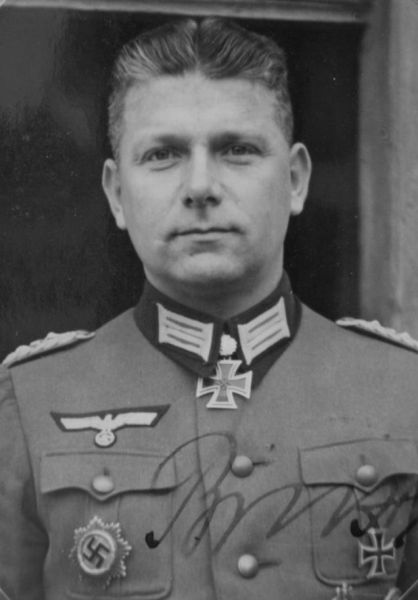Brux, Albert
- Date of birth:
- November 11th, 1907 (Lauban/Lower Silesia, Germany)
- Date of death:
- December 16th, 2001 (Mainz/Rhineland-Palatinate, Germany)
- Nationality:
- German
Biography
Do you have more information about this person? Inform us!
- Period:
- Second World War (1939-1945)
- Awarded on:
- November 1st, 1939
- Period:
- Second World War (1939-1945)
- Awarded on:
- May 30th, 1940
- Period:
- Second World War (1939-1945)
- Rank:
- Hauptmann (Captain)
- Unit:
- Kommandeur I. / Schützen-Regiment 66 / 13.Panzer-Division / III.Armee-Korps / Panzergruppe 1 / Heeresgruppe Süd
- Awarded on:
- September 12th, 1941
“On the 19.-20.07.1941 the Bataillon leader of the I./Schützen-Regiment 66, Hauptmann Brux, was involved in the defense of the Perewo bridgehead over the Irpen river (southwest of Kiev) with his Bataillon minus one-and-a-half Schützen Kompanien. In this time he and his men bloodily repelled eight massive assaults by a fresh Caucasian division, all of which had the support of heavy weapons up to the level of heavy artillery. Personally leading from the foremost line, he skillfully directed his Kompanien, heavy weapons and reserves according to a clear battle plan and fire plan. His personal commitment, example and leadership was invaluable in ensuring that the assaults of at least 3 Bolshevik regiments were smashed before they reached the main battle line.
After being relieved by weaker elements of another division on the night of the 19./20.07.1941, Hauptmann Brux continued to retain his elements deployed here just behind the bridgehead at his own behest, having clearly understood the Russian offensive aims at this location. As such, when the Russians did indeed overrun significant elements of the bridgehead garrison early on the next day, he was in a position to launch an independent counterattack with his own troops. After hard combat they were able to swiftly restore the situation. During this attack Hauptmann Brux fulfilled the requirements for the Infantry Assault Badge for the 6th time.
Hauptmann Brux’s same swift decisiveness would later bring the Division into full control of Korssum on the 31.07.1941. Personally fighting from the foremost line, he used a still available Kompanie from his Bataillon to strike from the eastern flank against a strong enemy force west of Korssum. After a brief yet ferocious firefight he managed to beat this enemy force. 10 howitzers (15 cm), 3 anti-tank guns, 3 heavy mortars and 500 prisoners were captured.
Hauptmann Brux’s Schützen-Bataillon is the only such unit to have been continually subordinated to Panzer-Regiment 4 since the 22.06.1941. He has accompanied all our armoured attacks in his all-terrain car in order to swiftly direct his Bataillon on the basis of his own impression of the enemy.”
489th Award.
- Period:
- Second World War (1939-1945)
- Rank:
- Major
- Unit:
- Kradschützen-Bataillon 43
- Awarded on:
- January 23rd, 1943
Award 280/3.
- Period:
- Second World War (1939-1945)
- Rank:
- Oberst (Colonel)
- Unit:
- Kommandeur Panzergrenadier-Regiment 40 / 17.Panzer-Division / III.Panzer-Korps / 1.Panzer-Armee / Heeresgruppe Nordukraine
- Awarded on:
- June 24th, 1944
The Kampfgruppe first rolled through two heavily occupied enemy villages in a night march. It fended off a Russian flank attack and established a bridgehead near Ostroshany on the 16.01.1944, however just a few hours later the Kampfgruppe was itself encircled. The Soviets tried to annihilate the Kampfgruppe over the course of two days and nights (18./19.01.1944), however under the leadership of Oberst Brux these efforts were defeated. On the third day friendly armoured forces from the rear and the 16. Panzer-Division from the front managed to establish contact with the Kampfgruppe, and in doing so they closed the ring around multiple Soviet formations. In the fighting which followed the Soviet spearhead aimed at Uman was destroyed. This success would also go on to greatly assist the future relief efforts towards the Cherkassy pocket.
Oberst Brux would be awarded the Oakleaves for the great successes he brought about during this time.
504th Award.
Sources
- Photo: Deutsches Wehrkundearchiv
- - THOMAS, FRANZ & WEGMANN, GüNTER, Die Ritterkreuzträger der Deutschen Wehrmacht 1939-1945, Biblio Verlag, Osnabrück, 1993.
- Die Ordensträger der Deutschen Wehrmacht (CD), VMD-Verlag GmbH, Osnabrück, 2002
- Kwasny A., Kwasny G., Die Eichenlaubträger 1940-1945 (CD), Deutsches Wehrkundearchiv, Lage-Waddenhausen, 2001
- Kurowski F., Feldwebel Kurt Knispel, Der erfolgreichste Panzerschütze und Panzerkommandant des 2. Weltkrieges, Flechsig Verlag, Würzburg, 2007
- Patzwall K., Scherzer V., Das Deutsche Kreuz 1941-1945, Geschichte und Inhaber Band II, Verlag Klaus D. Patzwall, Norderstedt, 2001







